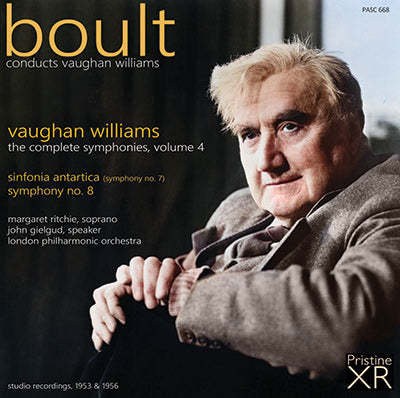
This album is included in the following sets:
This set contains the following albums:
- Producer's Note
- Full Track Listing
- Cover Art
As is well known, Vaughan Williams created his Sinfonia antartica out of the film score he created for the 1948 film Scott of the Antarctic. Greatly moved by its subject matter, the composer actually wrote some 996 bars of music before receiving the actual film script. Only about half of that music made its way into the film, but RVW was by then already contemplating writing a symphony with the whole. Due to work on other projects, notably completion of his opera The Pilgrim’s Progress after 45 years’ gestation, the symphony was not finished until early 1952. RVW dedicated it to Kelville Ernst Irving (1878–1953), the veteran theater director and music director at Ealing Studios, who had commissioned the film score. The premiere was given by John Barbirolli and the Hallé Orchestra and Choir, with soprano Margaret Ritchie, on 14 January 1953; performances in London, Chicago, and Sydney followed soon thereafter. The initial reviews, all extremely favorable, dovetailed in making much the same points: comparison to Beethoven’s “Pastoral” Symphony as a programmatic yet truly symphonic depiction of nature; a breaking of new stylistic ground by an octogenarian composer at the height of his creative powers, whose creativity continued to evolve; the work’s unconventional structure; the extremely colorful orchestration, with use of organ, vibraphone, and wind machine; and the virtuoso execution by the performers.
By contrast, the Symphony No. 8, composed in 1953–55 and premiered on 2 May 1956 by the same conductor and orchestra and dedicated to the former (“For Glorious John”), although received enthusiastically by its first audiences, provoked widely divided reactions from critics. Whereas RVW’s first seven symphonies were all considered to have explicit or implicit programs, for the first time he was seen to be offering a purely abstract work in that genre. Somewhat provocatively, he described the first movements as “seven variations in search of a theme” and said that the work utilized “a large supply of extra percussion, including all the 'phones and 'spiels known to the composer.” The negative notices duly seized upon these details to fault the work for deficit of form, dearth of inspiration, and reliance upon gimmickry.
Writing in The Manchester Guardian (May 3), Colin Mason charged that “the new symphony does not quite satisfy as a complete musical form.” While offering guarded praise for the first three movements, he excoriated the finale: “[T]he clattering din of the last movement, in which the whole percussion array is in action almost throughout, has no justification as a resolution of what has gone before, nor any in relation to the real musical content of the movement itself, which would have been more satisfying without this added noise, the only effect of which is to draw attention to the flimsiness and poverty of the material. This is the weakest movement in the symphony, at the bottom of the decline the work describes in its progress from first movement to last, a slight decline through the first three movements and a very steep one in the last.” Writing in The Observer (May 6), Peter Heyworth patronizingly characterized the piece as “a relatively slight affair. But just because it is so unpretending, it leaves in the main a pleasing impression,” and then damned not only the finale but the composer’s competence: “In the finale … he unlooses an orchestral tornado which sweeps up every hitting instrument within reach…. But this orgy is as unaccomplished as it is inappropriate. The trouble is that in matters of orchestral virtuosity Dr. Vaughan Williams remains an invincible amateur…. [I]t was just as well that Ravel was not present at the Free Trade Hall to hear what his old pupil was up to.” By contrast, Felix Aprahamian in The Times (May 6) declared: “From first to last, every bar of this admirably transparent score bears the hall-mark "R.V.W." This eighth symphony may well become the most loved and popular of the series.” Also in The Times (May 15), Frank Howes found that the summary statement of the finale’s chief themes “carries the argument to a satisfactory conclusion” and that a repeat hearing “removed some doubts” about the first movement as well.
In these two symphonies only, Boult’s recordings were not disc premieres, as the world premiere performers waxed them a few months earlier for HMV and Pye Nixa, respectively. The broadcast of the world premiere performance of the Eighth also has been released. Soprano Margaret Ritchie appears in both versions of the Sinfonia antartica, with Boult’s rendition adding readings by Sir John Gielgud of the prefatory quotations to each movement, a practice adopted by only five of seventeen recordings of that work released to date.
JAMES ALTENA
BOULT Vaughan Williams Symphonies Volume 4
VAUGHAN WILLIAMS Sinfonia antartica (Symphony No. 7)
1. 1st mvt. - Prelude: Andante maestoso (10:53)
2. 2nd mvt. - Scherzo: Moderato (5:50)
3. 3rd mvt. - Landscape: Lento (11:26)
4. 4th mvt. - Intermezzo: Andante sostenuto (6:22)
5. 5th mvt. - Epilogue: Alla marcia, moderato ma non troppo (10:59)
Margaret Ritchie, soprano
John Gielgud, speaker
VAUGHAN WILLIAMS Symphony No.8 in D major
6. 1st mvt. - Fantasia: Variazioni senza tema (11:07)
7. 2nd mvt. - Scherzo alla marcia (per stromenti a fiato) (3:55)
8. 3rd mvt. - Cavatina (per stromenti ad arco) (8:08)
9. 4th mvt. - Toccata (5:02)
London Philharmonic Orchestra
conducted by Sir Adrian Boult
XR Remastered by Andrew Rose
Cover artwork based on a photograph of Vaughan Williams
Sinfonia antartica (Ambient Stereo)
Produced by John Culshaw & James Walker
Recorded 10,11 December 1953
Recording supervised by the composer
Symphony No. 8 (stereo)
Produced by Christopher Whelan
Recorded 7-8 September 1956
Recorded at Kingsway Hall, London
Engineered by Kenneth Wilkinson
Total duration: 73:42

